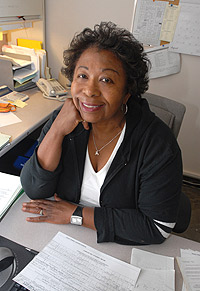Berkeleyan
Tapping into a hidden workforce
Retirement Center website helps managers hire temporary staff who already know their way around the campus
![]()
| 30 August 2006
At the end of a long career with the financial-services unit in UC's Office of the President, Irma Smith retired in 2000 after 29 years of service. But she didn't sit still for long: In March 2002 she posted her résumé on the Berkeley campus Retirement Center's Retiree Work Opportunities (RWO) website - and then got busy.
Smith is one of 60 retirees who have listed themselves on the RWO website (thecenter.berkeley.edu/rwo.html), currently used by more than 400 campus hiring managers and retirees to connect with one another. Shelley Glazer, executive director of the UC Berkeley Retirement Center, describes the website as "a way for hiring managers to take advantage of an additional source of part-time, temporary workers who already know the culture, probably know the processes that are necessary to complete a project, and can hit the ground running with very little training."
The Retiree Work Opportunities program's services are free to hiring departments and to retirees from the Berkeley campus, Lawrence Berkeley National Laboratory, and the UC Office of the President. Since the website was launched, traffic has increased and its functionality has expanded. Hiring managers can now use keyword searches on retirees' profiles and résumés, allowing employers to sort through potential candidates by plugging in campus IT system names, such as HRMS, BFS, or BAIRS. Using other keywords ("human resources," "accounting," "research," "teaching," or "project management") also allows hiring managers to identify and consider prospective candidates.
A full dance card
Over the past five years, Smith has had a host of assignments through RWO, all drawing on her accounting experience. She's worked in Capital Projects, ESPM's insect biology division, Extramural Funds Accounting, and the architecture department - all in a part-time capacity. She looks for positions lower in the Berkeley job hierarchy than her former post in OP, where she helped allocate funds provided to UC by the state government in Sacramento. "I don't want to work at a level that is too stressful," she explains. Still, Smith derives satisfaction from her temp assignments, getting involved at the beginning of a project and seeing it through to completion.
Her most recent part-time gig, in the architecture department, was intended to be a three-month assignment. It stretched past nine months, Smith says, because the department didn't have the funds to hire a full-time employee. Many of the department's professors had funds that needed to be spent before June 30, she says. "So we had to hustle." Hustle she did: Her supervisor so appreciated Smith's efforts that she arranged a Faculty Club lunch to thank her.
Returning to work on campus "offers me the satisfaction of staying in the Berkeley community and being a part of what's going on," says Smith. "I like meeting new people and taking on challenges in different departments." Having to learn their organization in order to provide a service for them "keeps me motivated and keeps my mind alert - it's a wonderful feeling."
By no means over the hill
 Bennie Smith, who says she "doesn't have to work just anywhere," has delayed retirement plans to travel with her husband and returned - albeit temporarily - to her old stomping grounds. (Peg Skorpinski photo) |
Bennie Smith (no relation to Irma) spent 27 years handling payroll and personnel issues in the College of Engineering, then four years at the Institute of Human Development (IHD) before retiring from the university in 2003. She had settled into retirement - taking care of younger and older family members, staying active in her church, and gardening - when she got a call this past spring from her former manager at IHD asking if she would come back temporarily to cover for her replacement, who was going out on medical leave.
"My experience there was so pleasant - a nice environment and nice people - that I decided to return," says Smith, who agreed to work two eight-hour days a week. She uses HRMS to manage the department's human resources and personnel tasks, and enjoys interacting with new graduate students from different parts of the country.
Today's retirees opt to work part-time to supplement their incomes, in some cases, or to stay involved with a concern larger than themselves, says Helen Dennis, an expert in aging at the USC Andrus Gerontology Center. "Berkeley is among the leaders - if not the leader - in changing its institutional thinking and policies around bringing retirees from the campus back into the workplace," she says of the Retirement Center's efforts. Such an approach rebuts a now-outmoded view of the retired population as "over the hill, no longer curious, and unable to make a contribution," notes Dennis, who says today's older adults are the most physically healthy and intellectually curious in the nation's history. Yet, says Dennis, despite all they have to offer, older adults are the most under-utilized resource in America.
Dennis worked with the Retirement Center to survey campus personnel managers about their work requirements and query retirees about their needs. "These retirees can contribute their wisdom, institutional memory, and experience," she says. "They've worked at the university a long time and want to remain a part of it. They're loyal, committed, motivated, and know how to get things done. You can't pick that up from a policy manual in a week."
For information about the RWO program, visit thecenter.berkeley.edu/rwo.html.

